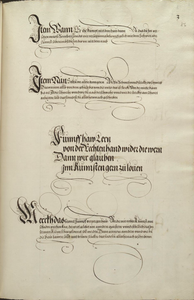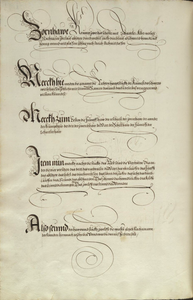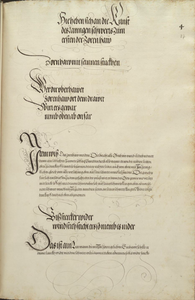|
|
You are not currently logged in. Are you accessing the unsecure (http) portal? Click here to switch to the secure portal. |
User:Kendra Brown/Latin Lew/82r
Munich 82 r / PDF page 9
Contents
Missing Zettel verses from Dresden 86r (9)
German
- Funnff haw Lern
- von der Rechetn hand wider die wern
- Dann wir glauben
- Inn Kunnsten gern zu louen
English
- Learn five strikes
- from the right hand[^1] against the defences.
- Because we believe
- in gladly praising[^2] the arts.
Notes
- [^1] (Fritz) “hand” may either signify literally “hand” but also “side”.
- [^2] (Garber) assuming that louen = loben to rhyme with glauben if you squint...
82r a
82r a Latin
- Porro quinque sunt Ictus artificiosi,
- multisque ignoti,
- quos si quis in nihilum potest redigere more Athletico absque sui detrimento,
- is certe non exiguam laudem merebitur apud pugiles probatissimos,
- atque merito opulentiora praemia ob hoc auferat,
- quam alij.
82r a English
- Hereafter are five skillful strikes,
- unknown to many,
- which, if any, can drive back into nothingness using the Athletic custom without defeat,
- he surely will have earned no small respect among the most proven boxers,
- and deservedly he would obtain the wealthier prize for this,
- than some.
82r a Notes
- pugil, pugiles: [DMLBS gives "1. boxer, wrestler. 2, participant in single combat. 3, one who fights on another's behalf"](https://logeion.uchicago.edu/pugil)
- Has the Latin scribe condensed German's entire last sentence into Latin's first word? Interesting; the Latin usually elaborates rather than condensing
- "in nihilum rediges" appears on 81v-c PHM Munich 81v (8), and 90v PHM Munich 90v (26)
Missing Zettel verses from Dresden 86v (10)
German
- Zornhawe krump zwer
- hat schiller mit Schaiteler /
- Alber • versaß
- nachraisen Iberlaüf • absetzen •
- durch wechsel • zuckh •
- durchlaüf • abschnneid / henndtruck
- henng • wennd • mit plossem [.]
- schlag • vach streich / stich mit stossen •
English
- Zornhau, Krump, Zwer
- has Schieler with Scheitler.
- Alber, displacing,
- following after, overrun, setting off,
- change through, jerk,
- run through, cut off, press hands,
- hanging, winding with openings,
- hit, seize, strike, stab with thrusts.[^3]
Notes
- [^3] (Fritz) We have translated some of the Early New High German terms into modern English, others however were left untranslated. When in doubt or for more information on each term, please consult the glossary.
82r b
Skipping the verse here also removes the redundant lists
82r b Latin
Primus est, qui ab ira apellationem sortitus est, Secundus dicitur Ictus curuus, Tertius, Transversarius, Quartus, qui à strabonibus nomen accepit apud gladiatores, Quintus ictùs, quo vertex hostis rectà adpetitur, ex his p[rae]cipue et principaliter Athletica constat, eor[um] descriptiones in sequentibus habebis.
82r b English
The First is, which gets its name from "ire"; the Second is called the "curved" Strike; the Third, “Transverse”; the Fourth, which takes the name "squinter" among fencers; The fifth strike, striving directly for the crown of the enemy's head: Athletics/Sport is especially and primarily based on these, you will have descriptions of them in the following.
82r b Notes
- Sortitus refers to the process of choosing by lots, but here might just be Latin scribe's choice to use a different word for "named" in each clause here. this could be relevant to the question of consistent term choices
82r c
82r c Latin
Rursus sunt habitus[^3] duodecim, quos Athleta norit, necesse est, Primus quatuor custodijs constat. Secondus, rationes quatuor, quibus hostis impetus repellitur[^1], Tertius, quo hostis instando urgetur. iiij, ensis traiectio, v, remotio[^2], vi, transmutatio, vii, ensis retractio, viii, transcursus, ix, abscisio, x, ratio qua hostis manus comprimu[n]tur, xi, inclinationes, xii, intorsiones.
Qua autem isth[a]ec exerceri debea[n]t ratio[n]e, rite et co[n]seque[n]ter iam describetur.
82r c English
On the other hand there are twelve aspects of the art, which athletes learn, that are essential, First it is agreed four guards. Second, four methods, with which the attack of the enemy is repelled, Third, by means of which the enemy having been threatened [may] be pressed hard, (Fourth), transferring the sword, (Fifth) deflecting, (Sixth) change about, (Seventh) withdrawing of the sword, (Eighth) running over, (Ninth) slicing off, (Tenth) method by which the hand of the enemy is crushed, (Eleventh) angles, (Twelfth) wrappings
Moreover any of these here must be practiced using the method duly and consequently now described.
82r c Notes
- [^1]: repellitur is one of the equivalents for 'versetzen'
- [^2]: remotio is the equivalent of 'absetzen'
- [^3]: The German original uses 'stueck' to indicate the techniques/aspects of the art that you will learn here. 'habitus' indicates the skills gained through repetitious practice, thus the habit engrained through practice, the habit of practice, the habitual skill, the skill itself. The translator uses 'habitus' to indicate fencing in general, collective skills or actions used in fencing, such as the work (arbeit) or the sequence (stück), and also substitutes for the named stances and cuts.
- "intorsiones" is not a standard spelling; DMLBS says it's a variant of intortio, which is a form of intorquere which can mean "twist/turn around [until something pops loose]" (ie sprain, hurl, twist/wrench limb) but also braid hair, wrap around, and roll eyes. Can't find the source that used it for bacon or hair *curling*
- Note: review the torquere verbs and their prefixes. *Done. intorqueo = einwinden. Contorqueo and torqueo = winden, and we translated as twist*
- Are they different words, or just an easy directional prefix? Directions done using equivalent prepositions in both languages.*
- the german doesn't have the phrase about practicing
Missing Zettel verse from Dresden 87r (11)
German
- Hie heben sich an die Kunst
- des Lanngen schwerts Züm
- ersten der Zorenhaẅ
- Wer dir uberhaẅet
- zorenhaw ort dem draẅet
- Wirt ers gewar
- nimb oben ab on far
English
- Here begins the art
- of the long sword.
- Firstly, the wrath cut
- He who throws an Oberhau
- is threatened by the Zornhau-Ort.[^4]
- If he becomes aware of it,
- take off above without peril.
Notes
- [^4] (Fritz) Literally the point of the Zornhau; see appendix.
- Zorenhaw ort dem drawet: the zornhaw point threatens that one [doing the überhawing]
- Potential pun: Drawet - pit trap large enough for wolves.
- orten - to align, point at, direct: must be an imperative if it’s a verb
- align your wolftrap with the zornhau
82r d
82r d Latin
- Ictus eius habitus[^5],
- qui ex ira appellationem assumpsit.
- Is ictus suo mucrone omnes Ictus superos avertit, quantumvis sit facilimus, & maxime agrestis: eum hoc modo exerceas. Si adversarius supernè caput tuum ex latere suo dextro adpetat, tu vicissim idem facito, remota omni defensione[^3], gladiu[m] ipsius contingens firmiter, atq[ue] subito mucronem ensis tui in faciem eius vel pectus convertito, Verum si is id observarit, nec non ensis parte firmiori impetum exceperit[^4], tum ensem ab ipsius ense surrigas, eo supernè remoto, versus aliud ensis latus rursum converso, caput ferias.
82r d English
- A strike of this skill,
- which takes up the name from "ire"
- This strike turns aside all upper strikes using its point, even though it is the easiest and most uncultivated. Employ it in this way: If the adversary approaches your head above from his right side, you do the same thing in turn, firmly touching his sword (since/when every defensive position has been set aside), and suddenly turn the point of your sword over to his face or chest. Truly if he notices this, and also if he would catch/intercept the attack using the stouter part of the sword, then you lift your sword up from his sword, it [your sword] having been intercepted above, turn back again toward the other side of the sword, you strike the head.
82r d Notes
- [^3]: 'remota' is used in other locations as equivalents for 'versetzen'. 'defensione' appears elsewhere as a translation of 'versatzung'. The German 'ohne alle Versatzung' [without any counteraction/counterposture] is presented in Latin as 'since/when every defensive position has been set aside'.
- [^4]: exceperit is an equivalent of 'versetzt' with a defensive aspect.
- [^5]: habitus here refers to the entire set of skills to be learned in the named cuts.
- Technical terms not used here:
- "Zornhau" is rendered "this strike"
- "Oberhau" is rendered "upper strike"
- Versatzung = expected displacement/setting aside/shifting of the sword/strike
- "Oben Abnehmen" is not mentioned at all



